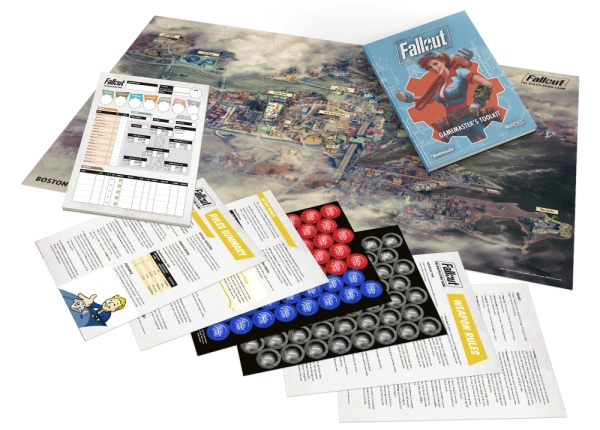Exile’s End
Exile’s End is a sci-fi setting for Hands of Fate, written by James C. Wilson and published by Audio Samurai Games.
By Cape Rust

Learn more about Exile’s End here
Purchase Exile’s End here
Find other Hands of Fate products here
Exile’s End is a combination of space exploration and space opera (imagine if Traveller met Star Wars at a drunken barn dance and had an interesting love-child). In this universe a series of gates were developed to facilitate interstellar travel. Those gates, and the convenience they afforded, led to an alliance amongst many worlds. While things ran well for a time, like all good things they came to an end. During this time the gates slowly started to malfunction and some ceased to work entirely, isolating far flung colonies
This game uses the Hands of Fate card-based system, rather than a normal dice-based system, for resolution. I will start with the use of cards vs. dice. Dice are part of RPG culture; people buy them; people roll them; people love them. Playing cards have made huge strides into the RPG world in the last decade. Many companies combine the use of dice and cards and a few have embraced the diceless use of cards. I am mixed on this type of system only because it creates a learning curve. Many systems do, so it isn’t that big of a deal, but I do fear that some potential customers will shy away quickly, not wanting to have to learn yet another system. The use of dice is more intuitive for most gamers and after getting over the learning curve, this game will definitely require everyone involved to keep a few cheat sheets around just-in-case. Reading the rules I could see where Hands of Fate has a poker vibe and, as with all things, the cards you draw depend on how successful your actions will be. If your cards are high enough, you get to take over the story for a bit and decide how the action occurs. Audio Samurai Games was smart to include some pictures of different card hands a player might encounter in game play and how those cards would apply to the rules as written. This was a good move and something that games that have non-standard aspects should include.
Now for the art and the layout of the book; I was pleasantly surprised with Audio Samurai Games’ candor on the matter. There is a explanation for why they chose they art that they did, and to be honest their logic is something that all small game design companies should think about. For this book, they went to Deviantart and found high quality creative commons pieces that complimented their game concept. They give tons of credit to the artists whose work they use and remind us all that there is quality art out there that won’t cost you a thing other than giving credit where credit is due.
Character creation is not difficult. You choose what your character does best and what they do worst – these choices have consequences during game play as one might expect. One really cool thing that Exile’s End did was add the scout ship that each adventuring group gets as an additional character with its own stats. It’s played a bit like an NPC familiar, but I liked that the players get to choose what their ship is good at doing. Yes the ship’s stats work differently than a regular Player Character’s, but this was a simple touch that was noteworthy. Because part of this game is exploration, it is nice that the players start the game with a ship. I understand that trying to obtain a ship can be fun, but it’s a real drag when you’re on an exploration mission and you have to hop on some NPCs ship simply because you and your fellow party members can’t afford one.
The types of ships encountered reflect the modularity of the system overall. There are some great examples of different types of ships that are out there, but you can decide to create a mid-sized spacecraft that can kick butt and haul a few of them as well. Simply go into the rule book, see how many attachments that size of ship can handle, then add what you want based on those size restrictions. This isn’t a new concept, but it was simple and clean. I enjoyed that there were a few ship pictures that included a ship of a smaller size category for comparison purposes. The equipment section was okay; not great, but okay. There were some pictures of some of the more non-standard weapons, which is always appreciated. There was a good use of actual candid shots of some of the armor, but I would have preferred a head on, full frontal line drawing of the more unusual types of armor over the candid portrait shots they used. Because many worlds are at different tech levels there is the usual inclusion of primitive weapons. There was also the obligatory cost based on planet tech level and restrictions on owning or obtaining these weapons based on a planet’s or system’s laws. I was glad to see that many military-type weapons were easily obtainable by the player characters as they are on a govt. sanctioned scouting mission.
Creature creation, system creation, and NPC creation stuck with the modular concept as well. All easy to learn and with very little tweaking could produce the legions of NPCs and alien life forms a game master needs to make things feel more alive. There was an ample set of example NPCs and aliens and many of the ones presented were exactly the types you’d expect to run into running around outer space. Any of the NPCs/aliens presented made great foundations for more custom encounters.
There is some amazing modular game design in this product. More and more companies are doing this and the industry has gotten away from its former lock-step self. Audio Samurai Games does modular really well. The Hands of Fate diceless card system makes sense, but I’m not sure if it’s my cup of tea. I will say that playing cards are much easier to find than those dice we all love and cherish so much. I could see keeping this game on hand for trips where everyone decides they want to game but are far away from dice (always pack dice). Another great use for the Hands of Fate system would be for gamers who are behind bars. Many prisons do not allow dice, but cards can be found everywhere. I was not bowled over by this game’s overall concept, but I’m often reminded that there are not new ideas out there and new ones are welcoming. The modular design of this game, combined with some amazing art, is two very high points. There is no doubt that the folks at Audio Samurai Games are gamers who want to share their passion and ideas with other gamers, and they do it well. Based on this game I will definitely check out some of their other products and we’ll see what the cards hold.



